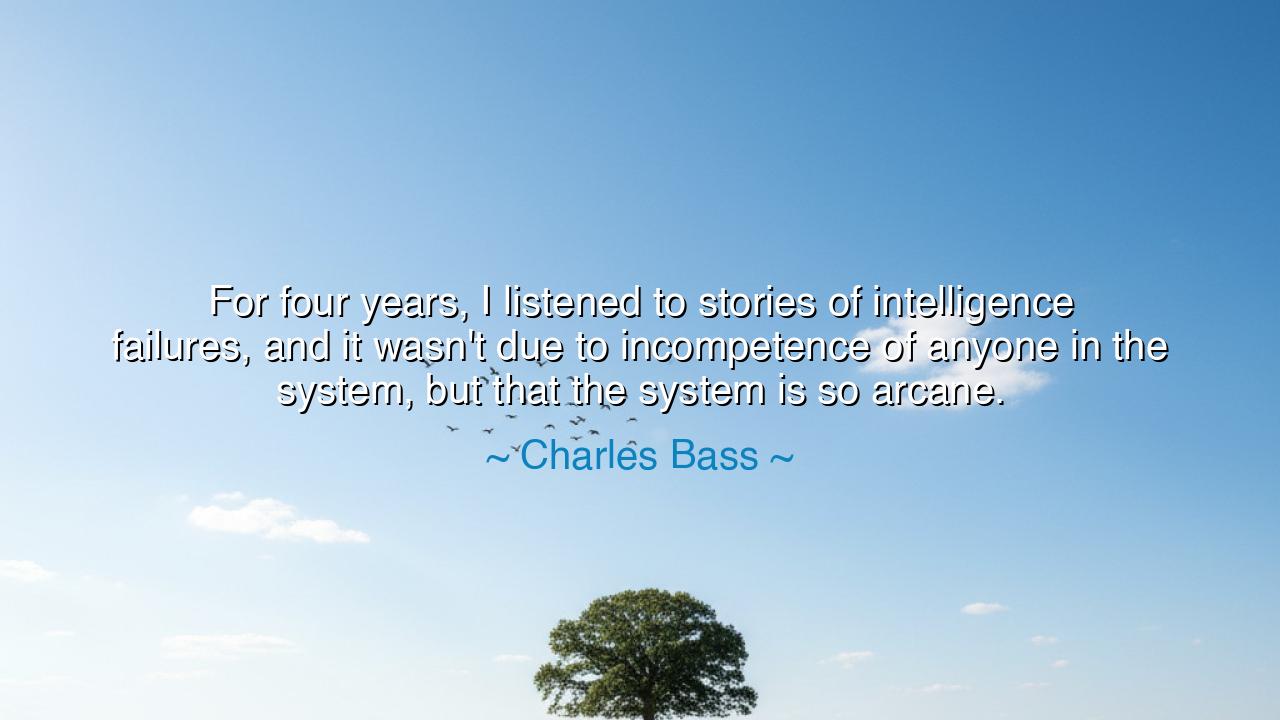
For four years, I listened to stories of intelligence failures
For four years, I listened to stories of intelligence failures, and it wasn't due to incompetence of anyone in the system, but that the system is so arcane.






“For four years, I listened to stories of intelligence failures, and it wasn't due to incompetence of anyone in the system, but that the system is so arcane.” Thus spoke Charles Bass, a statesman of the American Congress, reflecting on the labyrinthine world of intelligence after the great tremors of the early twenty-first century. His words, calm yet cutting, unveil a truth older than empires — that failure does not always spring from the folly of men, but from the weight and blindness of the systems they have built. In this reflection lies a lesson of enduring relevance: that institutions, when grown too vast and tangled, can stifle even the wisdom and courage of those within them.
To understand the heart of Bass’s words, one must recall the context in which they were spoken. The world had changed after the attacks of September 11, 2001. Nations searched their souls, asking how such devastation had been possible despite the presence of agencies devoted to protection and foresight. Committees were formed, testimonies given, and reports written. And again and again, a single theme emerged: that the failures of intelligence were not born of laziness or ignorance, but of fragmentation and opacity — the ancient ailment of bureaucracy. What Bass called “arcane” was the web of rules, silos, and secrecy that prevented knowledge from flowing freely, that turned clarity into confusion and urgency into inertia.
Such a condition is not unique to governments. It is the curse of all systems grown too old and too proud, systems that were once instruments of strength but have become their own masters. The Roman Empire, at the height of its power, suffered from this same disease. Its legions remained strong, its generals loyal, yet messages and orders crawled through a bureaucracy so rigid that crises unfolded faster than commands could reach the field. The system, once a shield, had become a prison. Rome did not fall because its soldiers forgot how to fight, but because its institutions forgot how to move. So too, Bass warns, can modern intelligence — or any form of governance — lose its edge not through incompetence, but through complexity that has devoured purpose.
In his tone there is no bitterness, only recognition of a deeper truth: that systems are the creations of humanity, yet they can outgrow their creators. What begins as order often becomes rigidity; what begins as wisdom can turn to ritual. Within the world of intelligence, where secrecy is both shield and burden, this transformation is particularly cruel. Each layer of protection adds distance between those who know and those who must act. Thus, even the most capable minds are hindered by structures too intricate for urgency, too proud for adaptation. The “arcane” nature of such systems is not in their mystery, but in their inability to evolve.
This truth is mirrored in the story of Daedalus, the ancient craftsman who built the labyrinth for King Minos — a structure so complex that even he, its creator, could scarcely escape it. The labyrinth, like the intelligence system Bass describes, was meant to contain danger; instead, it became a symbol of human overdesign. The minotaur of inefficiency, hidden within, devoured all who entered. And just as Daedalus had to fashion wings to rise above his creation, so too must humanity find ways to transcend the systems that imprison its potential.
Bass’s reflection, then, is both a lament and a call to renewal. It reminds us that competence alone cannot save a flawed structure — that wisdom must be matched with reform. The system, however noble its intentions, must remain agile and clear. In every realm — from government to business, from education to art — we must ask ourselves: have we built systems that serve people, or systems that people must serve? For when procedure triumphs over purpose, the outcome is always failure disguised as fate.
Therefore, O listener, take this teaching into your heart: examine the systems around you, whether great or small, and dare to challenge their arcane patterns. In your work, seek clarity over complexity, and simplicity over ceremony. Do not mistake tradition for truth, nor bureaucracy for wisdom. The world does not need more rules; it needs more responsiveness — more courage to act when knowledge is clear, more humility to adapt when it is not. For as Bass reminds us, the tragedy of failure often lies not in the weakness of men, but in the labyrinth they have built around themselves.
And so, let his words endure as both warning and wisdom: do not let the structures of your making become the barriers of your progress. The truly intelligent system — whether in a nation or in a single mind — is one that evolves with purpose, that listens, that learns. Only then can we ensure that knowledge, once gathered, does not drown in its own complexity, but rises — swift, clear, and free — to light the path of action and truth.






AAdministratorAdministrator
Welcome, honored guests. Please leave a comment, we will respond soon